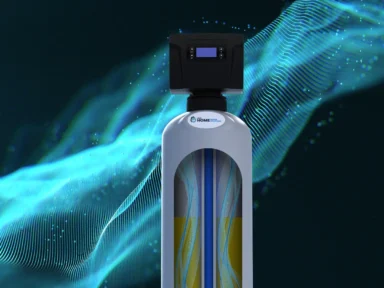If your hair feels brittle, you’re battling limescale buildup in your bathrooms, or your appliances aren’t lasting as long as they should, hard water may be to blame. Hard water, 85% of homes in the U.S., is caused by high levels of dissolved minerals, such as calcium and magnesium, which can be seen in pipes through buildup, commonly referred to as limescale.
This is when a water softener comes in handy. From preventing mineral buildup in your dishwasher to helping clothes get cleaner, softening the water does a great deal. That’s because it helps remove the water’s natural hardness. By helping remove these minerals, hard water is converted into soft water, a process facilitated by the use of a water softener.
However, determining the best water softener for your home can be a challenging task. In this article, we’ll cover the things you need to consider before investing in a water treatment system, like the size needed for your home, water softening vs conditioning, pricing, and more.
In this article:
- What is a Water Softener?
- Step-by-Step Guide on How to Choose the Best Water Softener
- Choose the Right Water Softener For Your Home
- Frequently Asked Questions
What is a Water Softener?
Not to be confused with water conditioning, which alters the behavior of minerals in water without removing them, a water softener helps remove high-concentration minerals. Without those high amounts of dissolved minerals, appliances last longer, soap dissolves better, and the household has access to higher-quality drinking water.
Types of Treatment for Hard Water
The two primary types of hard water treatments are salt-based ion exchange and salt-free conditioners. As their name implies, the most significant difference between them is whether the system utilizes salt to help remove hard water minerals.
Salt-Based Ion Exchange Water Softener
Ion exchange water softeners are both the most effective and the most common softening systems. These water softeners use salt to power an ion exchange process that helps remove calcium and magnesium (the minerals responsible for water hardness) and replaces them with sodium or potassium ions. The exchange occurs in a tank filled with negatively charged resin beads that are preloaded with sodium (or potassium). When the positively charged calcium or magnesium ions pass through the system, they bind to the resin beads and replace the sodium ions. When this happens, those ions are pulled out of the water, and the sodium ions are put into it.
Salt-Free Water Conditioners
A salt-free water conditioner won’t remove the minerals, but it will change their chemical structure through a process called Template Assisted Crystallization (TAC), which turns the minerals into tiny crystals. That change makes it harder for minerals to form scale buildup because it’s more difficult for the crystallized minerals to stick to things like pipes and shower walls. In that way, these conditioners do help reduce many of the problematic effects of hard water, but without a softener, the home will still technically have hard water.
A water conditioner is the best option for households located in areas where salt-based systems are not permitted, but it is also a good choice for families with low-sodium diets.
Step-by-Step Guide on How to Choose the Best Water Softener
Finding the best water softener for your household isn’t as simple as knowing how much water you use. It is essential to consider all aspects, including your usage, space requirements, cost, and the hardness of your home’s water.
Step 1: Determine Your Water Hardness & Household Usage
Before you do anything else in this process, you’ll want to determine your home water hardness level and identify your home’s water usage. You’ll need both to determine the size of water softener your household requires. You can find your water hardness by purchasing a water test kit, contacting your local water utility, or, better yet, getting a free professional water test from a water expert at Leaf Home.
Hardness is measured in grains per gallon (GPG) and ranges from slightly hard with 1 GPG to over 10.5 GPG for very hard water. The hardness of your home’s water will help determine the capacity needed to soften it fully. The higher the hardness level, the larger the softener. For example:
Hardness level (GPG) × daily water use = daily capacity needs
5 GPG x 400 (for family of four) = 2,000 grains
Step 2: Choose Your Softener Type
When choosing a water softener, several variables must be considered, including determining which one best suits your budget. Here is a simplified breakdown of certain factors; however, evolving technology can alter how these use cases ultimately work out.
Most Effective: Salt-Based Ion Exchange Water Softeners
- Best for homes with moderate to very hard water
- Single-tank systems are more affordable and space-efficient but may deliver hard water during regeneration cycles.
- Dual-tank systems help ensure a continuous supply of soft water, ideal for larger households or high water usage.
Low Maintenance: Salt-Free Water Conditioners
- Great for reducing scale buildup and maintenance, but not for improving lather, soap efficiency, or skin feel
- More environmentally friendly because they use no salt, waste no water, and require less energy
Least Expensive: Magnetic/Electronic Descalers (Conditioners)
- Use magnetic or electromagnetic fields to change the composition of the minerals so they’re less likely to adhere to pipes
- Evidence of effectiveness is mixed, and they don’t remove minerals
Best for Taste and Odor: Hybrid Water Softeners
- Combine ion exchange and a carbon filter to both soften the water and help remove unwanted elements like chlorine, sediment and odors which affect taste and smell
Softener Lifespans
- Ion exchange water softener: 10 to 15 years
- Dual-tank water softener: 15 to 20 years
- Salt-free water conditioners: up to 20 years
- Magnetic: 6 to 10 years
Step 3: Evaluate Installation Requirements, Features & Maintenance
Regardless of the type of water softener you choose, there are a few general considerations to keep in mind before installation. Please note that the amount of space required will depend on the size of the softener you select.
Salt-Based Systems
- You want to install it in a dry, level area.
- Ensure that the area has access to a water supply line, a power outlet, and a drain.
- Ensure the outlet nearest to the installation point is grounded.
- Check the salt level once a month and add more salt as needed.
- Note that the appliance will need to regenerate the resin tank, typically every few days, to restore its ion exchange capacity. This is often the case when water usage is low, such as in the middle of the night.
- Schedule yourself to check the softener for leaks at least once a month.
- Be prepared to clean the system at least once a year.
Conditioners
- You want to install it in a dry, level area.
- Schedule yourself to check the softener for leaks at least once a month.
- Be prepared to clean the system at least once a year.
- Replace the filter cartridge every six months.
Step 4: Compare Costs & Certifications
Certifications
When purchasing a water softener, look for certifications attached to it. For example, the National Sanitation Foundation (NSF) certifies efficient softeners. If a softener is NSF certified, it means that it has undergone rigorous testing and approval by the NSF. For example, Leaf Home’s salt-free water conditioners have NSF-certified fiberglass pressure tanks that help ensure structural integrity and durability.
However, if the appliance simply states “certification/certified to NSF standards,” that means it may meet the NSF’s standards, but the NSF did not conduct its own testing.
Costs
The cost of water treatment systems can vary quite a bit based on the brand and size needed for your home. For an accurate estimate based on your specific needs, schedule a free consultation with a Leaf Home water expert.
Step 5: Match Treatment to Your Needs
Depending on where you live in the country, you may not be allowed to have salt-based water softeners. Areas of California, Connecticut, Massachusetts, Michigan, and Texas have bans or heavy restrictions on these softeners due to the amount of wastewater they can create.
You may also want to consider a water softener over a conditioner if you have well water instead of city water. That’s because well water often has a higher hardness rating than city water, as it enters the home without undergoing commercial treatment.
Choose the Right Water Softener For Your Home
Choosing the right water softener is essential for the health of your appliances and pipes. That’s why it’s important to understand your water use and hardness levels before choosing one type over another. For a comprehensive solution to your water softening needs, including professional installation, contact Leaf Home Water Solutions to help ensure your home enjoys the benefits of softer water.
Frequently Asked Questions
What does GPG mean?
GPG stands for grains per gallon and is the measurement of the amount of dissolved minerals in a gallon of water. The GPG level indicates the hardness of the home’s water and typically ranges from 1 to 10.5 GPG (or higher).
What is the difference between a 48000-grain and a 64000-grain water softener?
The grain capacity of a water softener indicates how much hardness it can remove before the resin bed in the system needs to go through a regeneration cycle.
What size water softener do I need?
A home’s water softener size depends on the home’s water usage and the hardness of the water. As of 2025, the average household of four uses 400 gallons of water per day. So, if you live in an area where the hardness grains per gallon (GPG) is 5 and you use 400 gallons of water per day, you will need a softener that can soften 2,000 GPG per day.
Do I need a water softener if I have a filter?
Most likely, yes, because each appliance serves a different purpose. A water treatment or water filtration system will help reduce contaminants such as chlorine from your water, while a water softener helps remove dissolved minerals like calcium. Water filtration systems do not soften water because their primary objective is to help reduce other contaminants.



